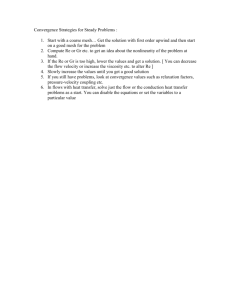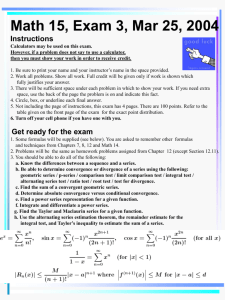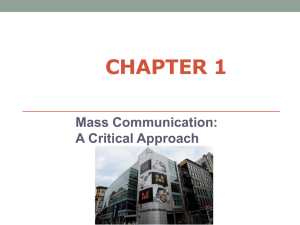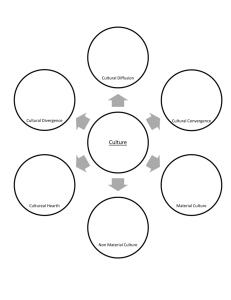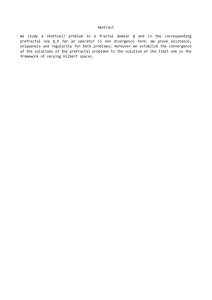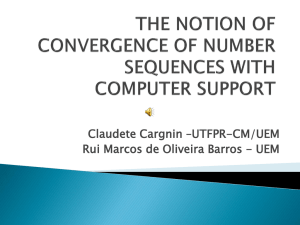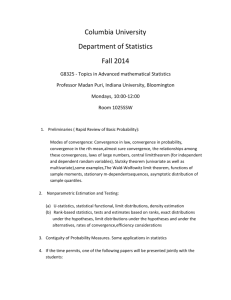convergence-of-tax-laws-in-line-with-ifrs-mujahid
advertisement
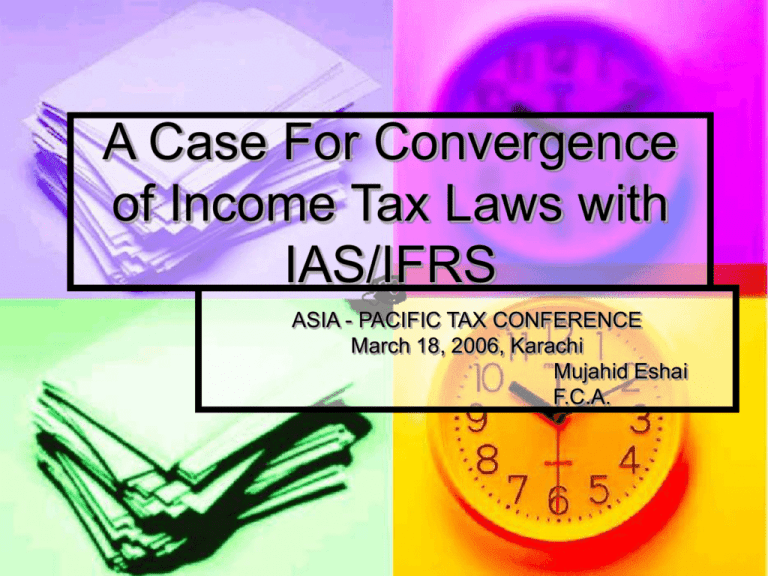
A Case For Convergence of Income Tax Laws with IAS/IFRS ASIA - PACIFIC TAX CONFERENCE March 18, 2006, Karachi Mujahid Eshai F.C.A. CONVERGENCE (cont’d.) Convergence is the act or fact of coming together or near Tax laws have always been the sacred domain of Governments. Through these laws Governments all over have provided incentives for Investment in industry, Commerce and business while laying down the rules for collection of Revenues for its administrative and Public Interest Infrastructural, Social, Educational and Economic Programs. As long as Protectionism was the buzz word the approaches developed were for the local industry etc. whilst not foregoing the Government’s need for funds. Investments across borders were relatively small and not driven by economic motives alone. CONVERGENCE (cont’d.) Alongside this approach particularly in new born states was a desire to succeed at all cost and through any means. A need to record the transactions or keep the books also emerged followed by a need mandatory or otherwise to undertake audits. Tax laws framed were thus detailed rules of what constituted proper books and how various transactions would be verified or dealt with or accepted as valid business sources of income or expenditure. Obviously the first need was to meet the Tax requirements. Accordingly books and records were maintained to meet these requirements. CONVERGENCE (cont’d.) The emerging economies were also becoming large Cash Economies with increasing issues relating to documentation of underlying transactions. A Quote from the 3rd report of the Australian Tax Office Task Force on Cash Economy is relevant: “A key issue for many small business operators is their ability to understand and meet their taxation obligations. Businesses in high risk cash economy industries display a common range of basic problems. 1. poor record keeping 2. poor cash flow management 3. Inaccurate invoicing procedures 4. poor national tax number usage practices These problems generally arise due to a lack of understanding rather than a deliberate intention not to comply.” CONVERGENCE (cont’d.) The Tax laws used to, until quite recently, talk of “Whatever accounting method employed.” Commercial Accounting on the other hand only advocated two methods viz., Cash and Accruals. The two methods now stand recognized explicitly. The Income Tax Ordinance now also by virtue of Rule 32(2) in Part-III recognizes the existence of International Accounting Standards - A giant leap forward. However, in my opinion, the IAS/IFRS usage and application with reference to the preparation of Financial Statements should be made a part of the Ordinance. CONVERGENCE (Cont’d.) It is therefore, in my opinion, no longer necessary for the Income Tax law to explain how the transactions should be recorded and treated in the Books of Accounts and presented and disclosed in the Financial Statements. Indeed, only if any accounting treatment, as specified in the Accounting Standards, is not in accordance with the policies or there is additional information required in respect thereof or a differing treatment or a fiscal incentive given should there be a cause for detailing. The Accounting Standards along with their interpretations issued by IASB are sufficient and revised on a regular basis. CONVERGENCE (cont’d.) • Convergence does not imply complete oneness. There is room for departure. The departures could be due to any one or a combination of the following: 1. Public Policy 2.Transfer Pricing 3. Structural Reasons 4. Avoidance 5. Tax neutrality 6. Capital items 7. Fiscal incentives 8. Symmetry 9. Realisablity &Tax Capacity 10. “True Reflection” CONVERGENCE (cont’d.) For example, Fines and Penalties will not be allowed as a permissible expense for tax purposes as these are a result of a public policy . Tax holidays may be deemed necessary in certain areas or activities with the objective of achieving industrial or economic growth as part of Public Policy. Accelerated or additional Depreciation as a fiscal incentive may be allowed. CONVERGENCE (cont’d.) Accounting Standards are generally not concerned with these issues. They may and do suggest consequential preferred treatment or lay down the principles for situations resulting from such departures. Timing and/or temporary differences resulting in deferred tax assets and liabilities is an example. IAS 12 (INCOME TAXES) deals with the subject in detail. It now talks of a ‘TAX BASE’ (that is determining a tax value) for assets and liabilities which may cause the creation of a statement of assets and liabilities based upon this concept for the purposes of calculating the deferred tax liabilities to be reflected in the Financial Statements. As such separate tax computations, based on the results declared in the Financial Statements prepared in accordance with the IAS, will continue to be required. CONVERGENCE (cont’d.) Temporary difference = difference between tax base and carrying amount. Will result in tax or deduction when sold or settled. Accrue deferred tax liability for nearly all taxable temporary differences. (Partial provision and deferral method prohibited.) Accrue deferred tax asset for nearly all deductible temporary differences if it is probable a tax benefit will be realised. Note: Tax assets will be recognised more often than before. Accrue unused tax losses and tax credits if it is probable that they will be realised. Review and reduce if appropriate. Use tax rates expected at settlement. Non-deductible goodwill: no deferred tax. Un remitted earnings of subsidiaries and associates: Do not accrue tax. Capital gains: Accrue tax at expected rate. CONVERGENCE (Cont’d.) Do not "gross up" government grants or other assets or liabilities whose initial recognition differs from initial tax base. Disclosures: components of tax expense, tax on equity items, reconciliation of tax expense and tax paid; balance sheet items. IAS 12 does away with the old income statement approach of timing differences and instead looks at balance sheet approach of temporary differences. If there's a difference between an asset's tax base versus its booked carrying amount, you must provide for deferred taxes on the difference. CONVERGENCE (cont’d.) In my opinion, the tax authorities in Pakistan need to pay due attention to IAS 39 and 32. IAS 39 has major implications for the economy and all those involved with it. Position papers need to be prepared keeping the economic environment in view and discussed in a transparent manner with all concerned. Derivatives, their accounting and an equitable tax treatment needs consideration. Hedge accounting, forward contracts are issues that need to be examined with clear cut, unambiguous pronouncements thereon. CONVERGENCE (cont’d.) Fair value accounting of assets and liabilities with resulting intangibles and their treatment for tax purposes requires study and alignment. Companies Ordinance Section 237 (1) states: “There shall be attached to the financial statements of a holding company having a subsidiary or subsidiaries, at the end of the financial year at which the holding company’s financial statements are made out, consolidated financial statements of the group presented as those of a single enterprise and such consolidated financial statements shall comply with the disclosure requirements of Fourth schedule and International Accounting Standards as are notified under subsection (3) of section 234 CONVERGENCE (cont’d.) IAS 27-Consolidated And Separate Financial StatementsPARA 22 states “…In order that the consolidated financial statements present financial statement about the group as that of a single economic entity…” CONVERGENCE (cont’d.) The two have the same objective - A financial picture as a single entity. Therefore at least where the group holding company is also listed publicly and has wholly owned subsidiaries a case for treatment as a single taxed entity can be considered. Relevance of Consolidated accounts, fair value measurement and equity accounting does not exist in our tax law. Fair Market value as defined in the Tax Ordinance only relates to acquisition or disposal of Fixed Assets and other transactions such as perquisites, house rent etc. CONVERGENCE (cont’d.) Section 59(B) of the IT Ordinance suggests a proportionate set-off of losses to a controlling share of 75% or more. particularly as a controlling interest is defined as in excess of 50% by both Companies Ordinance and the IAS. As far as Equity method of accounting is concerned this is not recognized in the tax law and the issue has been referred to in my paper. CONVERGENCE (cont’d.) I would only like to state that there is a dire need to re-examine our tax laws in the light of the changes in the Corporate world and the underlying principles. The time is ripe to move from a pure, classical revenue oriented approach to a principle based approach. CONVERGENCE (cont’d.) Perhaps a beginning can be made by re-defining and separating Corporate Tax Policies for Listed Companies who have to prepare their accounts in accordance with the IFRS/IAS, from individuals and other non-listed and privately owned entities. The LTU/MTU were a second step, in my opinion. Harmonization of the tax base by using and accepting the global accounting standards will eliminate the plethora of frivolous time wasting appeals against assessments. Assessments should not be subjective but based on hard evidence or departure from laid down principles. A 100% convergence is not possible nor desirable. CONVERGENCE (Cont’d.) Going a step further, both accountants and tax practitioners, especially in India, have often been heard pining for a complete harmony between tax provisions and accounting diktats enshrined in accounting standards though sceptics as well as some fiscal experts dismiss this out of hand, as an idle romanticism. The truth, however, is that there is a case for bringing about harmony to the extent possible between tax provisions and accounting tenets not only in the interest of simplification but also to quell the need for tax on book profits which is not only retrograde in nature but also reflective of the confused state of mind of the Government. Quote from Article by S. Murlidharan in Daily Business Line dated 16/8/2001 CONVERGENCE (THE END) THANK YOU!
